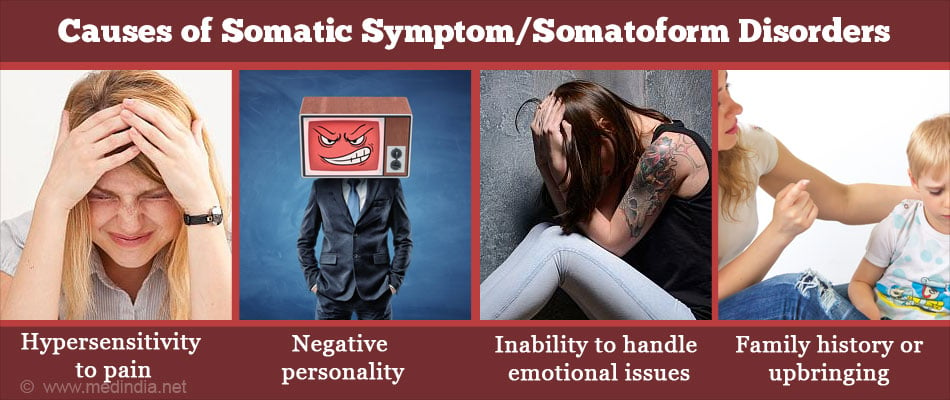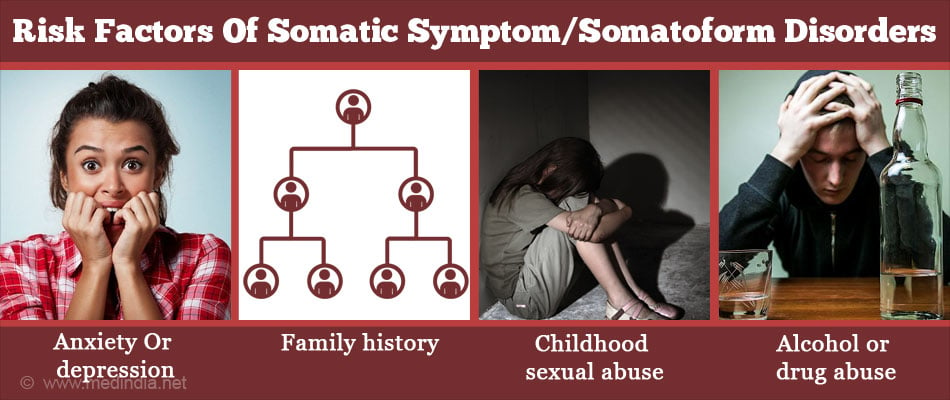- Somatic Symptom and Related Disorders - (https://familydoctor.org/condition/somatic-symptom-and-related-disorders/)
- What Is Somatic Symptom Disorder? - (https://www.psychiatry.org/patients-families/somatic-symptom-disorder/what-is-somatic-symptom-disorder)
What is Somatic Symptom / Somatoform Disorder?
When mental or psychological factors cause physical symptoms such as headache or diarrhea, it is referred to as somatization. Often such physical symptoms are short-lived and go away once the stress or emotional factors ease.
When these physical symptoms persist longterm (more than six months), are severe and cause the person a great deal of distress, it is termed somatic symptom disorder. Somatic symptom disorder is said to occur when a person’s focus, feelings and behavior related to physical symptoms is excessive and affects normal functioning.
Often, the person is convinced there is a physical cause for his symptoms although none may be evident even after thorough physical examination and investigations. Aptly these symptoms are also termed “medically unexplained symptoms”. Thus somatoform/somatic symptom disorders represent an extreme degree of somatization.
Studies suggest a prevalence rate of 0.1-0.2 percent in the general population and one general practice study reported a prevalence rate of 16.1, increasing to 21.9 percent when somatoform disorders causing mild impairment were also included. Symptoms usually begin before 30 years of age and are more common in women.
It would appear to others that these symptoms are imaginary although the patients themselves may be severely distressed by their symptoms, occasionally serious enough to even interfere with their daily activities. It is often frustrating both for the patient as well as his doctor as no cause can be found for these troubling symptoms.
What are the Types of Somatic Symptom Disorder and Related Disorders?
Somatic symptom disorders were earlier referred to as somatoform disorders which were a separate entity according to the DSM-4 (Diagnostic and Statistical Manual of Mental Disorders – 4) of the American Psychiatric Association. The following conditions were earlier recognized under the term “somatoform disorders”.
- Conversion disorder – This is a somatic symptom disorder where a person actually loses a sensory or motor bodily function, resulting in blindness, deafness, paralysis, or numbness or sometimes suffers from seizures.
- Somatization disorder - Persons with somatization disorder can have various physical symptoms related to any body part such as pain, nausea, vomiting, bloating, headaches, sexual dysfunction, irregular menstruation and balance problems.
- Hypochondriasis - Persons with hypochondriasis often imagine that they suffer from a serious illness when they experience minor symptoms. For example, a bloating sensation or indigestion may be attributed to having a stomach cancer or a headache may be attributed to a brain cancer. Frequent health care visits don#$#t relieve the concerns and in fact, make them worse. Reassurance by doctors and relatives does not help either.
- Body dysmorphic disorder - The afflicted person is unduly concerned with body image, manifesting as excessive concern about and preoccupation with a perceived defect of their physical appearance that is not very obviously apparent to others.
- Pain disorder - Persons suffering from pain disorder suffer from chronic pain for which no physical cause can be found.
- Undifferentiated somatoform disorder and Somatoform disorder not otherwise specified (NOS) – Only one unexplained symptom is required for at least 6 months to qualify for undifferentiated somatoform disorder. If the duration is less than 6 months, the condition is referred to as somatoform disorder not otherwise specified.
In the newest version DSM-5 (2013), somatic symptom disorders are grouped under the term Somatic Symptom and Related Disorders which comprises of:
Somatic Symptom Disorder - Somatic symptom disorder is characterized by a person having an exaggerated focus and thoughts about physical symptoms, such as pain, weakness or shortness of breath, that results in severe mental distress and disruption of normal functioning.
Related Disorders:
- Factitious disorder – This is said to occur when a person produces or fakes physical or mental illness although not really sick, or intentionally makes a minor illness seem worse. A person with factitious disorder can also fabricate an illness or injury in another person for possible benefit.
- Conversion disorder - This is a somatic symptom disorder where a person actually loses a bodily function, affecting usually one of the senses or motor function resulting in blindness, deafness, paralysis, or numbness
- Illness anxiety disorder - This condition was earlier referred to as “hypochondriasis.” Unlike somatic symptom disorder, a person with illness anxiety disorder generally doesn’t experience physical symptoms but are unduly and excessively preoccupied with their health.
- Psychological factors affecting a medical condition: In this condition, the patient suffers from a medical condition, but the psychological and behavioural factors adversely influence the condition and may also interfere with the treatment.
- Other specified somatic symptom and related disorders: This group is reserved for conditions which cause somatic symptom disorders but do not fully meet the criteria of the above sub-classifications.
- Unspecified somatic symptom and related disorder: This group includes conditions where the patient suffers from predominant somatic symptoms but there is insufficient information to make the diagnosis.
What are the Causes of Somatic Symptom / Somatoform Disorders?
The exact cause of the somatoform disorders remains unknown. However several reasons or factors appear to play a role such as:
- Genetic or biological factors such as hypersensitivity to pain
- Personality type – A negative personality or worrying type of personality are prone to develop somatoform disorders. Antisocial types are also prone to develop these disorders
- Familial factors – Both genetic influences and family environment can predispose to somatoform disorders
- Inability to process emotions – An inability to handle emotional issues may lead to physical symptoms which become the focus instead of the emotional issues
- Conditioned behavior – Persons may sometimes transfer their emotional issues into physical symptoms because of the attention received and perceived benefits of being ill and to avoid doing activities they are uncomfortable with

What are the Risk Factors for Somatic Symptom / Somatoform Disorders?
Some of the factors that increase the risk of developing a somatoform disorder include:
- Presence of underlying anxiety or depression
- Ongoing medical illness or convalescence
- Presence of strong family history of a disease
- Undergoing stressful life events, violence or trauma
- History of childhood sexual abuse
- Lower socioeconomic status and low level of education
- History of alcohol or drug abuse

What are the Signs and Symptoms of Somatic Symptom Disorder?
The signs and symptoms of somatic symptom disorder may include some of the following:
- Somatic symptom disorder is marked by specific physical sensations, such as pain or shortness of breath, or more general symptoms, such as fatigue or weakness
- No medical or organic cause can be found and even if an underlying condition such as cancer is present, the symptoms are out of proportion to what is to be normally expected.
- The person may interpret even mild symptoms as serious and threatening despite no evidence to support it.
- The person may worry excessively about possible illness
- The person may repeatedly check his/her physical appearances for possible defects
- The symptoms may be single, multiple or varying at different times
- The excessive focus, thoughts and behavior related to the symptoms disrupt the person’s daily functioning
- The person feels that the diagnosis has been inadequate and is not convinced by doctor’s reassurances
- The person does not respond to treatment for the symptoms
It is essential to seek medical advice when the person’s thoughts and behavior with regards to these symptoms begin to impact their daily activities, and starts to affect their relationships.
What are the Complications of Somatic Symptom Disorder?
The complications of somatoform/somatic symptom disorder include the following:
- Health is affected
- The person is unable to perform routine daily activities and faces problems with working
- Interpersonal relationships with family and friends are affected
- Other coexisting mental disorders such as anxiety, depression or personality issues could worsen matters. The depression may result in suicidal tendency
- Financial stress occurs due to unemployment and heath care costs
How do you Diagnose Somatic Symptom Disorder?
Often the family doctor or general practitioner (GP), or other specialists are unable to find anything wrong even after thorough examination and exhaustive tests. The person becomes increasingly distressed and worried that no cause for his/her symptoms had been found. At this stage, the patient may be referred to a mental health professional for further evaluation and management.
It may be worthwhile considering a diagnosis of somatic symptom disorder under the following circumstances.
- Multiple and varied symptoms, arising in different organ systems.
- Symptoms that are vague and out of proportion to physical findings
- Chronic course usually longer than six months
- Presence of underlying psychiatric disorder such as anxiety or depression
- Prior history of extensive diagnostic testing
- Rejection by previous specialists
The Diagnostic and Statistical Manual of Mental Disorders (DSM-5), published by the American Psychiatric Association, has underscored the following points in the diagnosis of somatic symptom disorder:
- Presence of one or more somatic symptoms that are distressing and interfere with daily life
- Excessive and persistent thoughts about the seriousness of symptoms and having a persistently high degree of worry and anxiety about health and physical symptoms
- Spending too much time and energy on physical symptoms or health state
- Persistence of at least one concerning symptom, typically for more than six months, although the symptoms may vary in intensity and duration
How do you Treat Somatic Symptom and Related Disorders?
Treatment is quite challenging and difficult because patients with somatic symptom and related disorders typically are unwilling to admit that their symptoms are due to mental (psychological) factors. They get angry with their doctors who are unable to find the cause for their complaints.
The first time the diagnosis is discussed (after the initial investigations have failed to show any definitive cause) is a key moment in the doctor-patient relationship. It is important to describe the condition to the patient in a manner without reference to a psychosomatic illness.
The goal of therapy is to alleviate the symptoms and improve the quality of life and to resume the daily routine. The forms of treatment offered include psychotherapy and medications if appropriate.
Psychotherapy
If the patient understands that his/her physical symptoms might be related to psychological distress and a high level of anxiety, then psychotherapy, also called talk treatment can help to improve physical symptoms.

Cognitive behavioral therapy
- Teaches how to reduce stress and cope with distressing physical symptoms. It reduces one’s preoccupation with symptoms
- Teaches how to manage situations or activities that cause uncomfortable physical sensations. It changes one’s negative thought processes and beliefs and improves the personality
- Addresses anxiety, depression and other mental issues associated with the somatic symptom disorder
Thus, it improves daily functioning at home, workplace, interpersonal relationships and in social situations. The family may also be counselled so that the patient gets better support.
Medications
Medications do not play a significant role unless there is associated underlying anxiety or depression which may be treated with anxiolytics or antidepressants, respectively. Some specific conditions such as pain disorder and body dysmorphic disorder are treated with antidepressant drugs called “selective serotonin reuptake inhibitors”
It may take several weeks for the medications to show any visible effect and the doctor or patient should not set unrealistic goals such as a cure.
A supportive relationship with an understanding health professional is the most important aspect of treatment. Regular followups are essential to review symptoms and the person#$#s coping mechanisms.
Health Tips
- Practice stress management and relaxation techniques such as yoga and meditation
- Avoid alcohol and substance abuse
- Eat plenty of fruits and vegetables and whole grains
- Exercise regularly
- Get at least 8 hours of uninterrupted sleep every night
- Participate and get involved in family activities and social activities
- Visit your health care provider frequently to review symptoms









